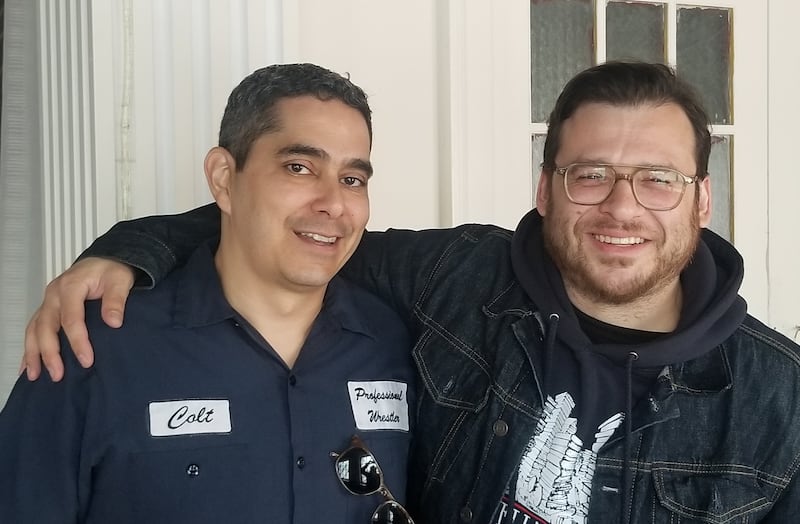For each of its seasons, Profile Theatre picks a single playwright or a group of playwrights to focus on. Currently, their theme is “The American Generation,” an umbrella encompassing the works of Kristoffer Diaz, Christopher Oscar Peña and Lauren Yee.
On Sunday, May 7, the trio will appear in conversation at Imago Theater. And in the days leading up to the event, Profile will present readings of brand-new plays by two of the playwrights: Diaz’s Reggie Hoops (Friday, May 5) and Peña’s Our Orange Sky (Saturday, May 6).
Diaz and Peña spoke to WW about creating new work, the challenges of being a playwright in the 21st century, and favorite Portland experiences.

WW: Kristoffer, Reggie Hoops and your play The Elaborate Entrance of Chad Deity are both set in the world of athletics. Are you drawn to those kinds of stories because there’s a theatricality to sports?
Kristoffer Diaz: Absolutely. I’m drawn to it because they say write what you know, and growing up, I was a big sports guy. I come from the sports world more than the theater world. As a kid, I was really into baseball and basketball. I used to get injured a lot—I broke my knee, my fingers—and I’m small, so I was never going to be able to pursue it.
Christopher, Our Orange Sky is about a character who is successful but feels unfulfilled and comes home. Were you inspired by a homecoming you had or wanted to have?
Christopher Oscar Peña: I think the thing I would say about Latino theater is that it’s rare to see Latinos onstage that are successful. I think usually we’re undocumented or uneducated or hiding [in plays]. There’s something about us that doesn’t allow us to be fucking messy in other ways, but still be people who have achieved. My family is the picture of the American dream. My dad was a janitor and now he’s a corporate CEO. That doesn’t mean we’re not struggling in other ways. I think it’s time that we got to have that conversation with each other, but also with audiences.
Kristoffer, is it fair to say Reggie Hoops is also about a successful person who is questioning, “Who am I? Where are we going?”
Diaz: We’ve both gone on and done things in the theater and in other places—which, as a playwright of this generation, you have to do. I teach, I do a little bit of TV, Chris does a lot of TV. You have to find success in other ways, and still come back to theater.
We’re both still in the trenches. We don’t make our living as playwrights. Nobody makes a living as a playwright. Success asks certain things of you that are not always great. It’s not always healthy. It puts stress on your family, on your relationships with your romantic partners, your kids.
Peña: We get tired of talking about racism in theater, but you can have six white playwrights and one person of color—and three of those white kids can have terrible reviews and still get a second shot, but a person of color won’t be seen for another decade. So we have to be working so much harder just to be visible. We both really believe in the idea of what theater is and what it can be, but it’s hard when the people who run those spaces are not necessarily the people who believe in us.
Anything in Portland, good or bad, that you’ve experienced that you want to share?
Peña: Portland reminds me of the early days of San Francisco, which could be really rocking cool, but as I’m getting older, I’m like, am I going to get killed on the street? But otherwise, it’s really beautiful. One of the actors took me out for drinks and there were two places we went. One of them—not my choice—was a male strip club. And the other was an arcade bar [Ground Kontrol]. We just played old-school Ninja Turtles and The Simpsons. To be like an almost 4-year-old playing video games is always great.
As far as the new plays, do the two of you have conversations about the differences between your writing processes?
Diaz: My wife—who, bless her, is at home with the two kids for eight days, nine days—said in so many words, “When you get back, we are getting this dog that we’ve been talking about for a long time because I can’t have the dog when I’m alone with the kids, but I need the dog. I need another love.” And Chris’ play is [partly about] this dog! The overlap is hilarious.
GO: The Playwright Convening will take place at Imago Theater, 17 SE 8th Ave., 503-242-0080, profiletheatre.org. 7:30 pm Friday, 2 pm Saturday, 2 pm Sunday, May 5-7. Readings $10, artists talk and reception $25.
